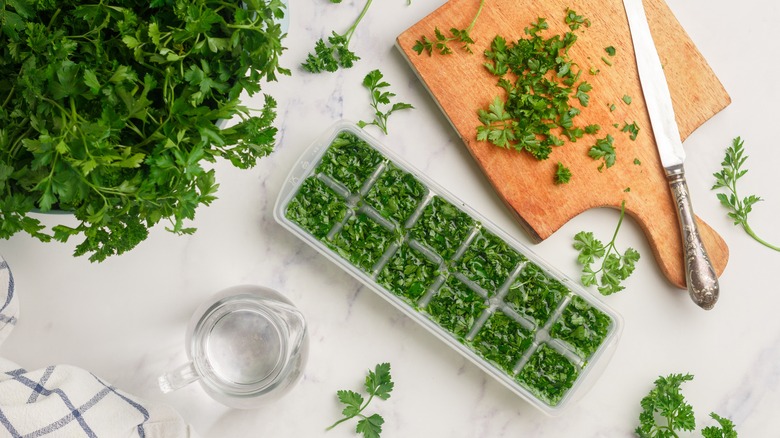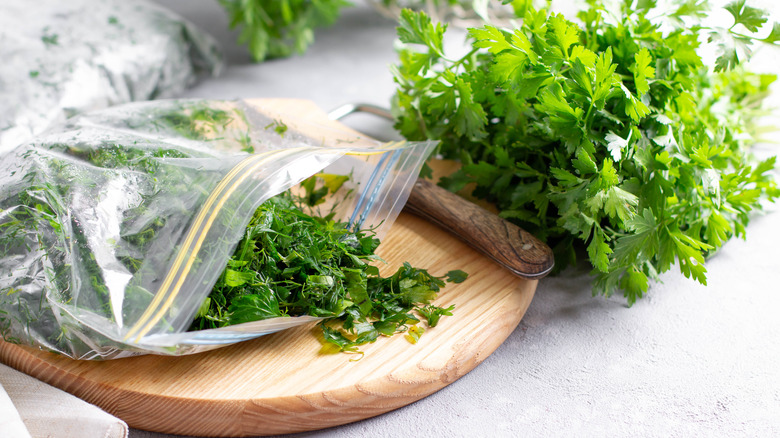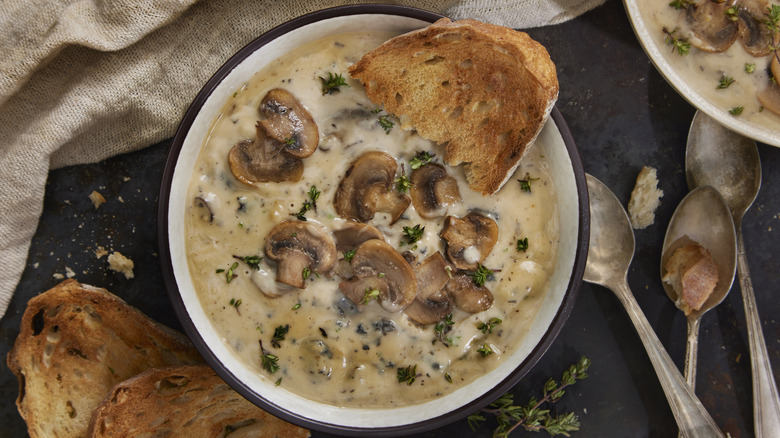You Should Definitely Be Freezing All Of Your Extra Herbs
Fresh herbs elevate even the simplest dishes into an experience. The problem is whether you grow your own or buy fresh herbs from your local grocery store, they don't last very long. While this paper towel trick can extend the life of your fresh herbs, they still will only last a few weeks at most. If you want to enjoy the scent and taste of herbs without waste, then you may be interested in freezing your extra herbs.
Since freezing changes the texture and appearance of herbs, you probably won't want to use thawed herbs as a garnish. However, freezing locks in the flavors for that zesty freshness so even in winter you can enjoy using these little compact blocks of herbs in sauces, soups, and cooked into other dishes. So next time you stock up on fresh herbs at your local farmer's market or grocery store, you can feel confident that these techniques mean you won't have to waste money throwing away wilted herbs again.
How to properly freeze your herbs
Depending on the herb and how you plan to use it, there are a few ways you can freeze your extra herbs. For soft herbs, the easiest method is to chop and destem them, then freeze them in oil. Ice cube trays work well for this and contain the herbs in a single serving portion. Plus, herbs maintain their color better when frozen in oil, according to Penn State University. This method also works well for fragile herbs like cilantro and basil; just be sure to cover the herb in oil to protect it from freezer burn. You can even blend the herbs and oil together (as you would in a pesto) before you freeze them if you prefer. Just don't preserve herbs in oil if you aren't going to freeze them since herbs in room temperature or even refrigerated oil can provide a place for harmful Clostridium botulinum bacteria to grow, according to Oregon State University.
Freezing herbs in water using ice cube trays is a popular variation of this method, but this only works well for some dishes like soups or stews, which will already have water added to them and will cook for a long time. For other meals, ice cubes may cause your dish to cook unevenly or become watery.
If you have extra thicker, hardier herbs like rosemary, you can clean and freeze them whole. Simply spread them out in a thin layer on a baking sheet, then freeze. Once frozen, gently transfer the herbs to plastic freezer bags for storage. When you want to use the herbs, simply break off a piece and toss it into your dish.
Don't let your frozen herbs thaw
Whatever freezing method you choose, make sure to use your herbs straight from the freezer — don't let them thaw. If you have ever thawed frozen herbs or leafy vegetables like spinach, you know what happens — when you thaw them out, the leaves lose their structure and are mush. Whenever a plant's leaves freeze, its cell walls rupture because the ice crystals expand beyond its limits. At that point, the leaves' structure has been destroyed and all of the liquid they contain will be released when they warm up. This alone may tempt you to stick with dried herbs, but it's an easy problem to avoid; pull your frozen herbs straight from the freezer and quickly add them to your casseroles, sauces, or homemade dips.
If you forget this important caveat and let your herbs thaw out, don't worry too much. Even if your herbs are a little mushy, that doesn't mean you can't use them in smoothies, soup, or even in an oil and vinaigrette dressing for salads. With a little planning (and a freezer), you'll be able to take advantage of summer's fresh flavor throughout the entire year.


